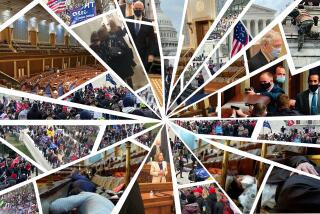A Democratic Russia Goes Up in Smoke : Yeltsin the dictator snuffs out Parliament with U.S. approval; why is the West cheering?
- Share via
The analogy to the events in Moscow is the Reichstag fire. In 1933, Adolf Hitler was a newly installed chancellor facing the prospect of an opposition Parliament. As the election drew near, an arsonist set fire to the Reichstag, the parliamentary building. Hitler then seized dictatorial powers, pleading as an excuse the threat to “democratic rule.”
Sunday’s foolish demonstration by the Russian Parliament presented Boris N. Yeltsin with the opportunity he had been waiting for. As his tanks and elite guards opened fire on the Parliament building--the Russian White House--the West roared its support for the would-be dictator. In 1933, the West supported Hitler, too.
But if Alexander V. Rutskoi and Rhuslan I. Khasbulatov, respectively vice president and parliamentary Speaker, were suicidally foolish in their sponsorship of Sunday’s face-off against Yeltsin’s military, Yeltsin was already guilty of the far greater crime of destroying Russian political reform.
The Russian Congress dissolved by Yeltsin on Sept. 21 had authentic democratic credentials. The deputies elected to it in March, 1990, had faced the voters under conditions far from the one-party rituals of the past. It was this same Congress of People’s Deputies that awarded Yeltsin his own political ascendancy and his executive post. Khasbulatov and Rutskoi stood shoulder to shoulder with Yeltsin on the balcony of the Russian White House to denounce the attempted putsch of 1991. It was this Congress that brought not only the executive presidency into being, but also the Constitutional Court, modeled on the U.S. Supreme Court.
So on Sept. 21, amid rising public resentment at his leadership, Yeltsin undertook the equivalent of suspending the Congress, the court and the constitution.
He did all this amid the cheers of the political leaders of the United States and other Western powers. Yeltsin sought and won Washington’s support for the final bloody assault, in which tanks set fire to a Parliament filled with civilians. The would-be putschists of 1991 never did that. If Clinton had been honest--if he had said, “My fellow Americans, democracy has nothing to do with it. This is about security for Western investments. My friends at the International Monetary Fund and the banks tell me Boris is their man, so we must stand with him”--one could at least have acknowledged the realism even while deploring the sentiment.
Economically, Russia remains stricken, plunged ever deeper into ruin by Yeltsin’s team, coached by the same gang of international advisers whose failures in Poland recently prompted that nation’s voters to give their biggest cheer to the former Communist Party.
Yeltsin dissolved Parliament on Sept. 21 because he was at the end of his tether. The breathing space and popular license of approval he had won with his victory in April’s referendum had been squandered.
The Yeltsin-controlled news shows and the parrot media in the West portrayed Parliament as nothing but a cabal of old hacks trying to turn the clock back.
There were hacks in the Russian White House, but there are hacks in every congressional chamber. That’s not normally taken as just cause to suspend the constitution. The Russian White House also had its idealists who took their responsibilities with the utmost seriousness.
The Yeltsin coup of Sept. 21, Rutskoi and Khasbulatov’s stupid countermove on Sunday, and now Yeltsin’s tanks have most likely closed the book on the democratic period in Russia that began in 1985 and peaked in 1990 and 1991.
There may be a new congress vested under a new constitution, but it will have far weaker countervailing powers against the boss in the Kremlin. The Constitutional Court will also have its powers drastically curtailed--if it survives at all.
Yeltsin is one of those politicians whose creativity is entirely destructive in nature. As a builder and policy-maker he has been a disaster. But time and again, he buys a new lease on life by forcing confrontation, as on Sept. 21, or by seizing opportunity presented by his enemies, as with the attempted coup of 1991 and Sunday’s folly by the parliamentary leadership. Then, at the moment of victory, his creativity expires.
At least there is symmetry. The West’s leaders greeted the onset of reform in Russia in the mid-1980s by saying it was a fraud. Now, by contrast, as dusk settles on the era of reform, as Yeltsin shuts down newspapers and bans political parties, they hail the gathering darkness as though it were the dawn.
More to Read
Sign up for Essential California
The most important California stories and recommendations in your inbox every morning.
You may occasionally receive promotional content from the Los Angeles Times.










